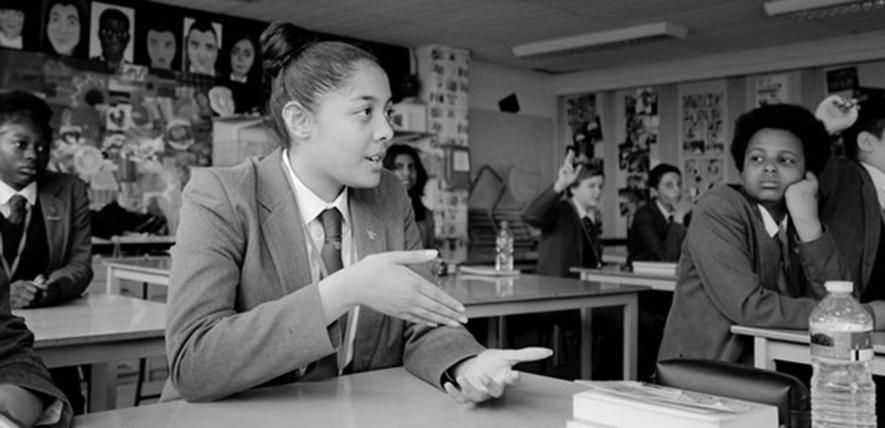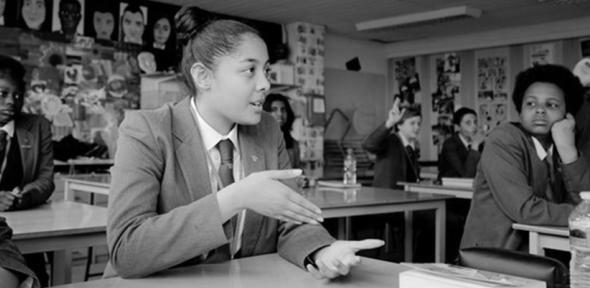
An analysis of a short programme teaching empathy in schools has found it had a positive impact on students’ behaviour and increased their emotional literacy within 10 weeks.
The findings come from an evaluation of the “Empathy Programme”: a term-long course developed by the UK-based Empathy Studios. The research was conducted with support from academics at the Faculty of Education, University of Cambridge.
Empathy Studios develops school-based, video-led programmes which aim to increase empathy in students aged five to 18. Students are shown thought-provoking films, then engage in approximately 30 minutes of activities and discussions about the issues raised. An annual flagship festival of films, resources & events, “Empathy Week”, is made available for free and has to date reached 1.3 million students worldwide.
Survey and interview data from 900 students and teachers at 10 participating schools in six countries, including the UK, revealed measurable, positive changes in students’ conduct, emotional awareness and curiosity about different cultures and the wider world.
Teachers rated students’ empathy, behaviour and other characteristics on a scale of one to 10 before the programme began, and five and 10 weeks later. The average empathy score rose from 5.55 to 7, while average behaviour scores increased from 6.52 to 7.89.
In follow-up interviews, one primary school teacher reflected: “I’ve definitely been able to resolve more issues within the classroom and not have parents called in.” A student told the interviewers: “I think that everyone in the class has become kinder.”
Empathy Studios defines empathy as: “The skill to understand others and the ability to create space for someone to reveal their authentic self while reserving judgement.” The company was founded four years ago by Ed Kirwan, a former science teacher from North London.
“The programme’s success lies in teaching students to celebrate difference, which changes their wellbeing and behaviour,” he said. “There’s never an excuse for poor behaviour, but often a reason, which greater mutual understanding can potentially address.”
“I think the social unrest we have seen in Britain this summer shows how urgently we need more empathy across society. It won’t solve everything, but it is the foundation for solutions, and it starts with education. If the new government is serious about curriculum reforms that prepare young people for life and work, we must ensure that school equips them to understand, be curious about, and listen to each other, even in moments of disagreement.”
The evaluation was supported by Dr Helen Demetriou, a specialist in empathy education at the University of Cambridge, who helped to design the research, and to collect, quality assure and interpret the data.
“The findings show that a fairly simple, film-based programme can raise pupils’ empathy levels, enhancing their understanding of themselves, others, and global issues,” she said. “That supports a more complete learning experience, developing social and emotional skills that we know contribute to improved behaviour and more engaged learning.”
Although it is often considered innate, evidence suggests that empathy can be taught. A 2021 study co-authored by Demetriou successfully trialled teaching empathy during design and technology lessons. More recently, researchers at the University of Virginia found that empathy between parents and children is “paid forward” by the children to friends and, later, when they become parents themselves.
Empathy has been linked to better leadership and inclusion in workplaces; while a 2023 World Economic Forum White Paper highlighted the importance of socio-emotional skills to the future of work and argued for more education that emphasises interpersonal skills, including empathy.
Empathy Studios offers schools assembly and lesson plans built around films about the real-life stories of diverse people in other parts of the world. Its 2024/5 programme, for example, profiles five individuals from Mexico: including a Paralympian, a dancer, and a women’s rights activist.
Their framework focuses on three core concepts: “Empathy for Myself”, which develops students’ emotional literacy; “Empathy for Others”, which covers mutual understanding and interpersonal relations, and “Empathy in Action”, during which the students develop their own social action projects.
The new research builds on a 2022 pilot study with the University of Cambridge, which suggested that the programme makes students more responsive to each others’ feelings and improves self-esteem. The new evaluation involved over 900 students and 30 teachers, and took place during 2023.
The teacher surveys indicated that behaviour had improved by up to 10% in some schools, especially those new to empathy lessons. The average improvement in behaviour recorded by UK teachers corresponded to the overall trend, rising from 6.3/10 pre-programme to 7.7/10 post-programme. Empathy and behaviour also appeared to be closely linked: all schools reporting an overall improvement in student empathy also saw improvements in behaviour after five weeks, which was sustained in 80% of cases after 10.
The evaluation recorded small improvements in students’ overall emotional literacy and their “affective empathy”; or their ability to share the feelings of others. A change that emerged strongly from interviews with teachers was that the Empathy Programme appeared to increase students’ interest in other cultures. In one primary school, for example, the proportion of students responding positively to the statement “I want to find out more about the world” rose from 86% to 96% after 10 weeks. This echoes Organisation for Economic Co-operation and Development (OECD) evidence linking empathy to civic engagement.
Many students said they had learned valuable lessons from the programme. Their reflections included: “Everyone struggles… I’m not the only one who finds it hard”, and “Although we are all different, we all have so much in common”.
“Empathy is the number one human skill we need to develop for the future,” Kirwan said. “It should not just be an add-on; it should be considered foundational.”
Further information is available from: https://www.empathystudios.com/
“The University of Cambridge is a public collegiate research university in Cambridge, England. Founded in 1209, the University of Cambridge is the third-oldest university in continuous operation.”
Please visit the firm link to site






